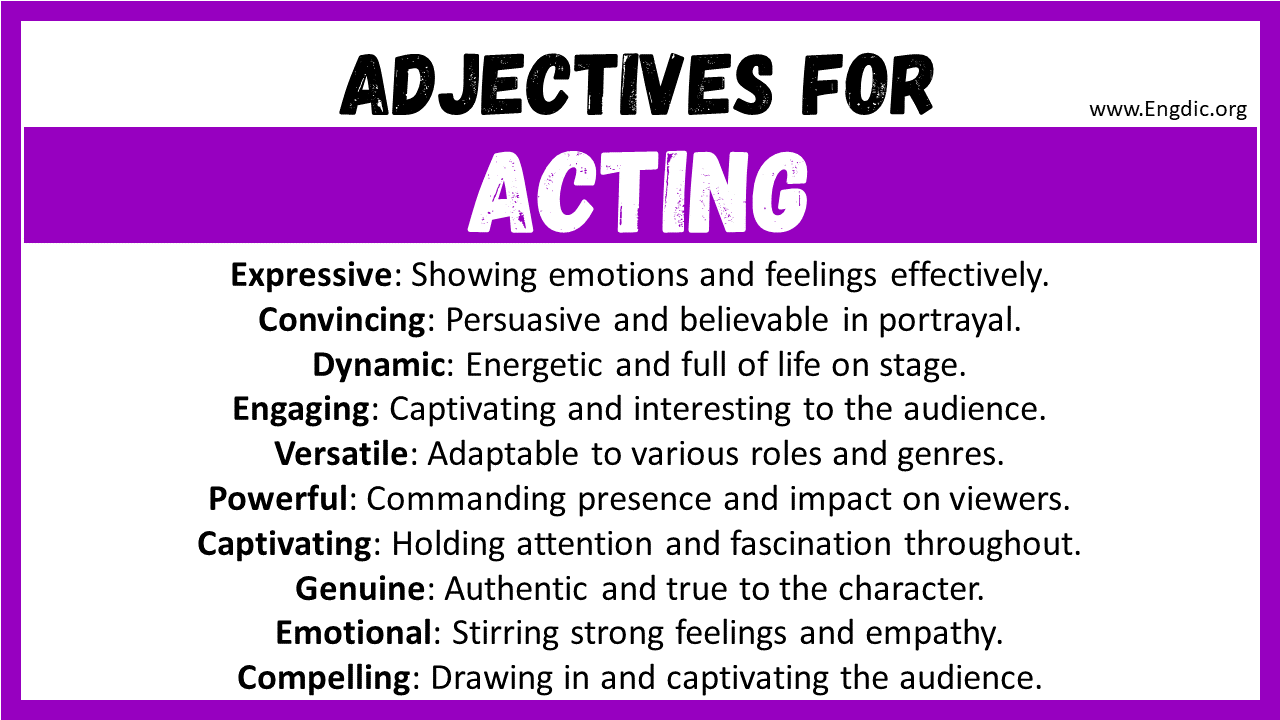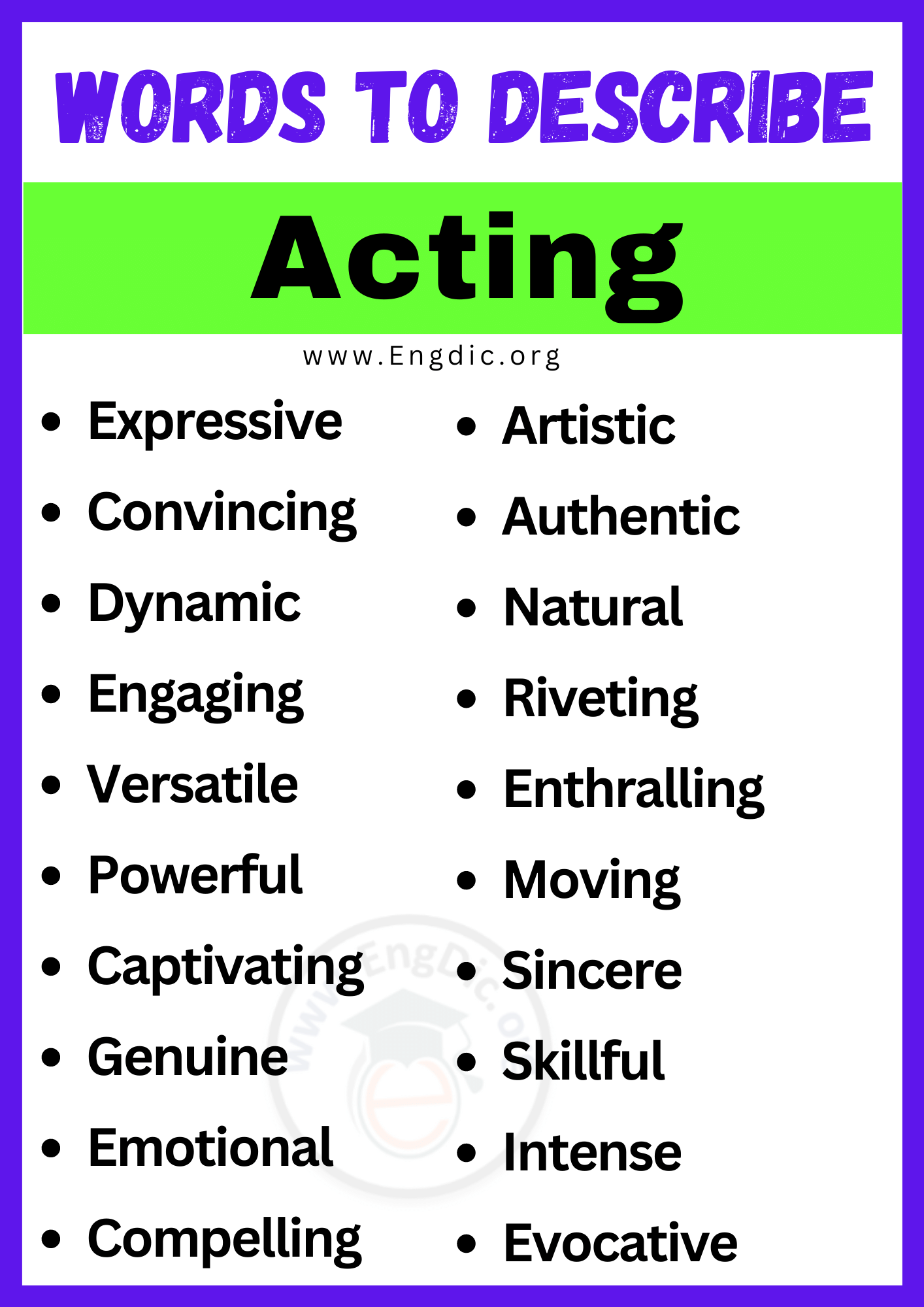Acting, in simple terms, is the art of portraying characters and emotions to tell a story, usually on stage or in front of a camera. It involves immersing oneself into a role, becoming someone else entirely, and evoking genuine emotions that resonate with the audience.
When it comes to describing acting, words like ‘expressive,’ ‘versatile,’ ‘convincing,’ and ’empathetic’ come to mind. These terms encapsulate the performer’s ability to convey a wide range of emotions, adapt to various roles, and connect with the audience on a profound level.
Adjectives for Acting
Here are the 20 Most Popular adjectives for acting:
- Expressive
- Convincing
- Dynamic
- Engaging
- Versatile
- Powerful
- Captivating
- Genuine
- Emotional
- Compelling
- Artistic
- Authentic
- Natural
- Riveting
- Enthralling
- Moving
- Sincere
- Skillful
- Intense
- Evocative
Adjectives for Acting Performance:
- Captivating
- Compelling
- Riveting
- Expressive
- Convincing
- Dynamic
- Powerful
- Authentic
- Engaging
- Stellar
Adjectives for Acting Skills:
- Versatile
- Proficient
- Skillful
- Polished
- Adaptable
- Resourceful
- Astute
- Nuanced
- Intuitive
- Impressive
Adjectives for Acting Crazy:
- Wild
- Zany
- Eccentric
- Unpredictable
- Offbeat
- Whimsical
- Outlandish
- Bizarre
- Wacky
- Insane
Adjectives for Fast Acting:
- Quick
- Rapid
- Swift
- Speedy
- Prompt
- Immediate
- Efficient
- Instant
- Agile
- Brisk
Words to Describe Acting with Meanings
- Expressive: Showing emotions and feelings effectively.
- Convincing: Persuasive and believable in portrayal.
- Dynamic: Energetic and full of life on stage.
- Engaging: Captivating and interesting to the audience.
- Versatile: Adaptable to various roles and genres.
- Powerful: Commanding presence and impact on viewers.
- Captivating: Holding attention and fascination throughout.
- Genuine: Authentic and true to the character.
- Emotional: Stirring strong feelings and empathy.
- Compelling: Drawing in and captivating the audience.
- Artistic: Creative and skillful in artistic expression.
- Authentic: Genuine and real in portrayal.
- Natural: Effortlessly realistic and unforced.
- Riveting: Holding the audience’s attention intensely.
- Enthralling: Fascinating and spellbinding to watch.
- Moving: Evoking deep emotions in viewers.
- Sincere: Genuine and heartfelt in performance.
- Skillful: Demonstrating expertise and proficiency.
- Intense: Filled with strong emotions and passion.
- Evocative: Stirring memories and emotions in spectators.
Example Sentences for Acting Adjectives
- The expressive actor conveyed joy effortlessly.
- Her convincing portrayal left the audience stunned.
- The dynamic performance energized the crowd.
- The play’s story was engaging and thought-provoking.
- He’s a versatile actor, excelling in every role.
- Her powerful monologue brought tears to her eyes.
- The captivating dance held the audience spellbound.
- His emotions seemed so genuine on stage.
- The emotional scene moved everyone to tears.
- The movie had a compelling storyline throughout.
- The play was an artistic masterpiece of creativity.
- The actor’s authentic accent added realism.
- His acting felt so natural and effortless.
- The riveting performance kept us glued to our seats.
- The story was enthralling, leaving us wanting more.
- Her moving speech touched everyone’s hearts.
- The sincere apology scene was heartfelt.
- The skillful actor effortlessly played multiple characters.
- The intense emotion brought intensity to the scene.
- The movie’s soundtrack was evocative and emotional.
Explore More Words:
Adjectives for Actor | Artist | Singer | Musician | Costume
Words to Describe Participation
Words to Describe Bad Acting
- Wooden
- Unconvincing
- Overdone
- Stiff
- Forced
- Monotone
- Awkward
- Inexpressive
- Amateurish
- Lifeless
- Hammy
- Inauthentic
- Flat
- Exaggerated
- Dull
- Unnatural
- Robotic
- Clumsy
- Uninspired
- Histrionic
FAQ’s
How to describe acting in writing?
Acting in writing involves vividly portraying characters, emotions, and interactions, creating a compelling narrative that engages readers’ imaginations. Focus on how the actor embodies the character, using physicality and facial expressions to convey emotions. Mention the delivery of dialogue – whether it’s powerful, nuanced, or expressive. Observe their interactions with other characters and the setting, noting how these elements enhance their portrayal. Consider the actor’s ability to evoke empathy or other emotional responses from the audience. Describe their command of the stage or screen presence. Include observations on how the actor interprets the script and brings their unique flair to the role, making the character memorable.
Is acting a skill or talent?
Acting is both a skill and a talent, as it requires training, practice, and honing of techniques, while some individuals naturally possess an innate ability to connect with characters and evoke emotions.
Is acting a career or hobby?
Acting can be both a career and a hobby; some pursue it professionally on stage, TV, or film, while others enjoy acting as a creative and recreational pastime.








